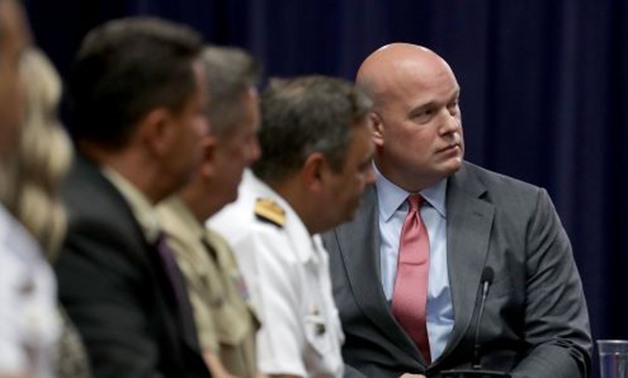
Justice Department calls Trump appointment of Whitaker lawful
WASHINGTON - 15 November 2018: The Justice Department on Wednesday defended the legality of President Donald Trump's appointment of Matthew Whitaker as acting attorney general to replace the ousted Jeff Sessions, rejecting the views of critics that the move ran afoul of the U.S. Constitution and federal law.
A legal opinion sent to the White House by the department's Office of Legal Counsel concluded that Whitaker's appointment as the chief U.S. law enforcement official was allowed under a 1998 law called the Federal Vacancies Reform Act even though he was not a Senate-confirmed official.
Democrats, some legal experts and the state of Maryland - which went to court on Tuesday to challenge the appointment - have said Trump violated the so-called Appointments Clause of the U.S. Constitution because the job of attorney general is a "principal officer" who must be appointed by the president and confirmed by the Senate.
Whitaker, a Trump loyalist, assumed authority over the ongoing investigation by Special Counsel Robert Mueller into Russia's role in the 2016 U.S. election - a probe that has led to criminal charges against several former Trump aides - after the Republican president forced Sessions to resign a week ago.
Top House of Representatives Democrat Nancy Pelosi accused Trump of dodging the Senate confirmation process and installing a "political lackey" to obstruct Mueller's investigation.
"The Appointments Clause in the Constitution - which clearly trumps any statute the administration's lawyers have chosen to cite - is violated by the president's brazen installation of a partisan hack whose reported history of shady business dealings, including involvement in patent scams and questions surrounding a taxpayer-financed loan, would preclude him from Senate confirmation," Pelosi said.
The Justice Department cited only one prior instance in U.S. history of a similar appointment as acting attorney general of an official who had not previously been confirmed to his job by the Senate, and that occurred in 1866.
'DOES NOT MANDATE'
The 20-page opinion stated that the Federal Vacancies Reform Act authorized a president to "depart from the succession order" established by a different federal law for filling a vacancy in the attorney's general position.
"It is no doubt that Presidents often choose acting principal officers from among Senate-confirmed officers. But the Constitution does not mandate that choice," Assistant Attorney General Steven Engel wrote in the new legal opinion.
Congressional Democrats have voiced concern that Whitaker, who in the past has taken issue with the scope of Mueller's investigation, could undermine or even fire the special counsel. Trump has called Mueller's investigation a "witch hunt."
Before ousting him, Trump criticized Sessions for recusing himself in March 2017 from the Russia investigation - now headed by Mueller but at the time conducted by the FBI. Sessions' recusal had given oversight of the probe to the No. 2 Justice Department official, Rod Rosenstein, who appointed Mueller after Trump fired James Comey as FBI director in May 2017.
Maryland also argued that Rosenstein should have succeeded Sessions under the separate federal law that vests full authority in the deputy attorney general should the office of attorney general become vacant. A hearing on Maryland's litigation is scheduled for Dec. 19.
Democrats, preparing to take control of the House after gains in last week's midterm congressional elections, signaled they plan to scrutinize Whitaker, who had served as chief of staff for Sessions.
Four senior House Democrats sent letters requesting information relating to Whitaker's past involvement with World Patent Marketing, a company accused by the government of bilking millions of dollars from consumers.
"It's significant that there is no precedent for a non-Senate-confirmed individual to serve as Acting AG (attorney general) within the past 100-plus years," Case Western Reserve University School of Law professor Jonathan Adler said.
Victoria Bassetti, a fellow with the New York University Law School's Brennan Center for Justice, said Whitaker is exercising the powers of a "principal officer" of the United States.
"Just putting that little word 'acting' in front of him doesn't change how the Constitution works," Bassetti said. "You can't wave a little magic wand over it, sprinkle a little fairy dust and kind of color slightly outside the lines on this one."

Comments
Leave a Comment